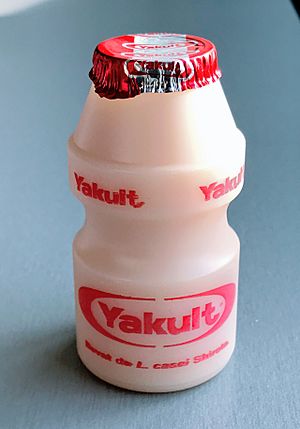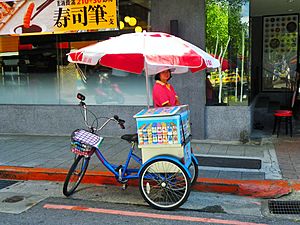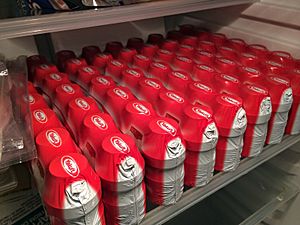Yakult facts for kids

A single serving of Yakult
|
|
| Type | Drink |
|---|---|
| Manufacturer | Yakult Honsha |
| Distributor | Yakult Honsha |
| Country of origin | Japan |
| Introduced | 1935 |
| Colour | Light peach |
| Ingredients | Ingredients |
Yakult (ヤクルト, Yakuruto) is a Japanese sweetened probiotic milk beverage fermented with the bacteria strain Lacticaseibacillus casei Shirota. It is sold by Yakult Honsha, based in Tokyo. It is distributed through convenience stores and supermarkets in single-serving containers of (depending on the manufacturer) 65 mL (2.3 imp fl oz; 2.2 US fl oz) or 100 mL (3.5 imp fl oz; 3.4 US fl oz), often in single-row packs of five or ten. The name "Yakult" was coined from jahurto, an Esperanto word meaning "yogurt".
Contents
Ingredients
Yakult's ingredients are water, skimmed milk, glucose-fructose syrup, sucrose, natural flavors (citrus), and live Lacticaseibacillus casei Shirota bacteria. The strain was originally classified as being Lactobacillus casei.
Yakult is prepared by adding glucose to skimmed milk and heating the mixture at 90 to 95 °C for about 30 minutes. After letting it cool down to 45 °C, the mixture is inoculated with the lactobacillus and incubated for 6 to 7 days at 37 to 38 °C. After fermentation, water, sugar, gums and lactic acid are added.
Health claims
In 2006, a panel appointed by the Netherlands Nutrition Center (Voedingscentrum) to evaluate a marketing request by Yakult found sufficient evidence to justify claims that drinking at least one bottle of Yakult per day might help improve bowel movements for people who tend to be constipated and might help maintain a healthy population of gut flora.
In 2010, a European Food Safety Authority (EFSA) panel denied a request by the company to market Yakult as defending the upper respiratory tract against pathogens (in other words, protection against diseases like the common cold), finding the claim not supported by the evidence.
In 2013, the UK Advertising Standards Authority disallowed an advertisement for Yakult in response to a complaint. It found that while there was sufficient evidence for the claim that "significant numbers of viable [Lactobacillus] survived transit to the gut [after consumption of Yakult]", the advertisement had made claims of general health benefits without providing a specific, referenced claim, as required.
Marketing history
Yakult was invented in 1935 in Japan by Minoru Shirota, who helped found the company Yakult Honsha for the purpose of commercializing it. Although Yakult is sold in Japan in supermarkets and convenience stores, it is also sold door to door in Asia and in Latin America in convenience stores.
History
- In 1930, Scientist Minoru Shirota strengthened and cultured the Lactobacillus casei Shirota strain
- In 1935, Yakult started being made in Japan.
- In 1955, Yakult Honsha was founded.
- In 1963, Yakult began a home delivery service, using 'Yakult lady' employees.
- In 1964, Yakult began selling in other countries, beginning with Taiwan.
- In 1968, Yakult opens its first factory outside Japan in the city of São Bernardo do Campo, Brazil.
- In 1969, the Hong Kong Yakult Co Ltd was founded.
- In 1969, Korea Yakult was founded in South Korea.
- In 1981, Yakult ventured into Mexico, opening a factory in the city of Ixtapaluca under the direction of Carlos Kasuga.
- In 1994, Yakult started being sold in Australia, Great Britain, and the United States.
- In 2004 Yakult started being sold in New Zealand, via Australia. Yakult LIGHT was first available in Australia in 2004. In 2017, Yakult reformulated Yakult LIGHT to boast further reductions in sugar and energy content and to use Stevia instead of sugar.
- In 2014, Yakult opened its first factory in the United States.
Relationship with Danone
In February 2018, it was reported that Danone planned to sell US$1.9 billion of its Yakult investment, reducing its stake from 21% to 7%. The plan was followed by a decline in Yakult's share value. Danone had first bought shares in Yakult in April 2000. The sale was completed in March 2018.
In mass media
In September 2018, it was reported that the appearance of unlabelled Yakult bottles in the 2018 film To All the Boys I've Loved Before led to a rise in the drink's sales that coincided with a 2.8% increase in share price following the film's release on 17 August.
In January 2020, professional sumo wrestler Takakeishō Takanobu appeared in a television commercial advertising Yakult 1000.
See also
 In Spanish: Yakult para niños
In Spanish: Yakult para niños
- Actimel
- Bikkle
- Calpis
- Fermented milk products
- List of fermented foods
- Tokyo Yakult Swallows




